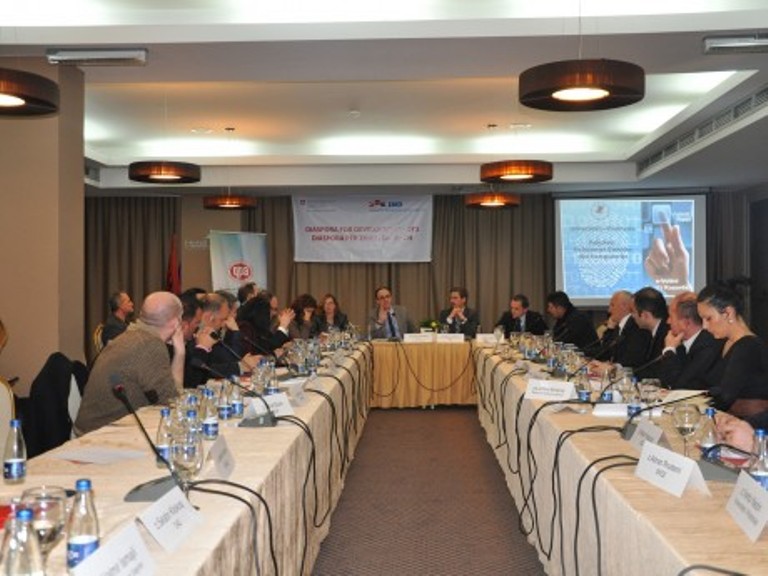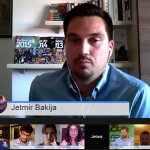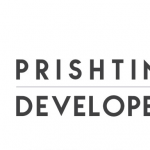
Diaspora Seminar in Prishtina: Bringing the Diaspora closer to home
By: Albina Makolli April 7, 2013
On March 29th and 30th, Diaspora for Development held a conference in Pristina about the Diaspora-representation in decision-making processes. The second meeting was held in order to discuss options for improving information flows and communication between the Diaspora and Kosovo, the home country.
These two days served to deepen the debate between the Kosovo society, local institutions, including the Kosovo government, its legislation and media. The goal was to find better ways of representing the Diaspora in decision-making processes in Kosovo, both on a local and national level.
The Institute for Management and Development (IMD) instructed the Kosovar Agency of Professional Journalists ( AGPK) and Albinfo (Information portal of the Kosovo Diaspora in Switzerland) to conduct the study “Improving communication and information flows between Kosovo and its Diaspora”. The AGKP analyzed the formal and informal communication channels between Kosovo and the Diaspora. It also prepared a presentation on how other countries communicate with their diaspora.
About 40 people joined the conference on March 29. Albinfo.ch, Tung.ch, Alba Radio (Switzerland), Gjiganti.com and others represented the Diaspora. A representative of the Ministry of Diaspora was there as well, including the media such as the RTK, RTV 21, Bota Sot, Zeri.
The results of this study were presented in the seminar, which took place the following day on March 30. 55 People took part in the seminar: Diaspora members such as the Albanian members of parliament in Switzerland Ylfete Fanaj, representatives from Belgium, Finland, Turkey, the United States, and others. The Minister of the Ministry of Diaspora was present, and representatives of various Kosovo political parties (PDK, AAK, AKR, Vetevendosje). Relevant institutions, such as non-governmental organizations were there as well.
As a result of the meetings all parties will work on establishing the Diaspora as a powerful element for decision-making processes in Kosovo. The parties agreed that the Kosovo Diaspora needs a greater number of representatives in Kosovo’s parliament. These representatives, who will also be representatives of Kosovo minorities, will enjoy reserved seats. Hence, taking part in elections is an equally important aspect of Kosovo’s relationship with its large Diaspora. It also became clear that, within the framework of constitutional amendments, the Diaspora’s role in Kosovo’s parliament needs to be defined in more detail.
Conclusions and Recommendations (Click here to see longer version of the results).
- Create a parliamentary commission for the Diaspora
- Create a register for the Diaspora, in order to be able to count the Diaspora members and give them the right to vote
- Provide a list of candidates especially for the Diaspora
- The elections may take place via diplomatic missions and consular sections
- Undertake necessary changes in the constitution and the voting legislation
- An existing mutual will to remain in a political relationship
- Establish an inclusive Council of the Diaspora from around the world, as a point of reference for the rights and interests of the Diaspora as well as better links between them and the home country
- Create channels for feedback and criticism for the Diaspora in order to lobby for political representation
- Prioritize communication, information sharing and transparency for policies that concern the Diaspora
- Determine the number of seats in the Parliament based on the electoral list participation
- Clarify criteria concerning representation/ number of qualified voters
- Reserve seats in the Parliament for the diaspora: up to 6 seats, of which 4 seats are distributed via direct voting by the Diaspora
- Change in the Diaspora legislation: reforming the Ministry of Diaspora
- Intensify formal communications with the Diaspora: identify Diaspora’s needs regarding a better representation
- Establish a transnational counsel with representatives of the Diaspora from all over the world, in order to take concrete steps towards the voting procedure, representation, number of representatives, allocation of counselors from the Ministry of Diaspora in each country that hosts Kosovar Diaspora members
- A concrete agenda where to hold gatherings of the representatives, transnational counselors, institutional counselors and political parties
Those information were provided by Diaspora for Development; particularly by Elbasan Morina and Rudina Heroi. The article was prepared by Albina Makolli.











